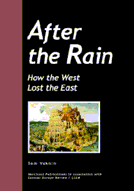In 1995, Montenegro exempted its conscripts from serving in the Yugoslav Federal Army (JNA). It opened its doors to a flood of Bosniaks (Moslems) during the Bosnia war and to Kosovar Albanians during Operation Allied Force. These independent policies stood in stark contrast to Belgrade's. As the latter engaged in shrill anti-Western campaigns throughout the 1990s—Montenegro persisted in its overwhelming wish to become a member of the EU.
No action to back up the words
In March 1997, Milo Đukanović took over the ruling Democratic Party of Socialists (DPS) and forced Momir Bulatović, a Milošević stalwart, to form the People's Socialist Party (PSP). Yet despite these tell-tale signs of disintegration, Đukanović and his reformist crew did very little over the years to prepare Montenegro for an inevitable secession.
As late as last year, the currently radical nationalist Đukanović was calling for moderation and dialogue, paranoically eyeing his old nemesis, Bulatović, who stuck to power even as his master was swept to prison on a popular wave of discontent. In a conspiracy-theories-prone area, this caused many to believe that Đukanović was merely angling for more power in the new Yugoslav constitutional arrangements.
Ethnic trouble looms
Montenegro is tiny—both absolutely and in comparison to Serbia, its "equal partner" in the improbable rump federation of Yugoslavia. At 14,000 sq km, it is half the size of Macedonia and with around 700,000 citizens has one third its population.
Yet, these two have many things in common. In both, for instance, minorities hold the balance of power. The pro-independence vote this weekend was largely decided by the Albanian community, which constitutes around seven percent of the population. They regard Đukanović as an ally in a largely Slav and hostile region. A sudden attack of Đukanović pre-election generosity—roads built, food distributed and handouts showered throughout the Albanian coastal settlements—only sustained this perception.
Ethnic Albanian parties are the big losers. They and their cantankerous leaders are cast as power-hungry, visionless and disunited. A similar situation (dispossessed Albanian parties fighting for their share of the spoils) in Macedonia led to the recent insurgency. Montenegro may be next.
The Muslims in Montenegro (16 percent of the total) object to independence, fearful of being disconnected from their co-religionist kith and kin in the Sandjak region in a Serbia alienated by Montenegrin secession. Both minorities have been the continuous targets of thinly disguised racial slurs and barbs by the Bulatović "Together for Yugoslavia" camp during the campaign.
A country in two minds
Minorities aside, the population is split right down the middle among the pro- and anti-independence factions. In another part of Europe, Montenegro could have aspired to emulate Luxembourg. In the Balkans, it makes for an appetizing prey. Its economy consists of foreign aid, smuggling (cigarettes, immigrants, prostitutes, drugs, and weapons, in this order) and dubious off-shore offerings (a bank licence goes for less than USD 10,000).
In the absence of either of these pillars of the economy, wages—already symbolic—are likely to spiral down and social unrest is likely to take the opposite course with a vengeance. Foreign aid may dwindle if Montenegro defies the West (read: the State Department). Both the USA and the EU are reluctant to see Yugoslavia further atomised. They fear the echoes of a Montenegrin independence, however democratic and peaceful, in less democratic and peaceful corners of the Balkans (mainly in Kosovo and Bosnia).
Thus, Montenegro's share of American foreign aid is now firmly ensconced in Yugoslavia's appropriation. Congress, as usual, ignores Foggy Bottom and continued allocate funds to Montenegro with reflexive abandon (close to USD 90 million last year alone). But even old Balkan hands like Holbrooke are coming around to the idea of an independent Montenegro.
The Montenegrin nationalist camp, in the meantime, is busy inventing a Montenegrin ancient history, demonising hegemonic Serbia and blaming Montenegro's backwardness on Milošević and his stranglehold. Typical Koštunica gaffes—belittling Montenegro and its inhabitants—did nothing to ameliorate the tension.
A pragmatic kind of politics
"The Victory is Montenegro"—Đukanović's outfit—promised a referendum about independence in June. It may well be postponed if the old-new Montenegrin leadership is sufficiently pampered and flattered by Đinđic and Koštunica. Both have said that they will accept Montenegrin independence should its people really want it. This is a matter of internal Serbian politics.

|
Đukanović may have been caught by surprise between the rock of his fervent nationalist propaganda and the hard place of Serb capitulation to his demands. Unable to fulfil most of his unrealistic campaign promises, he may yet find himself the president of an economically unviable and politically unstable statelet.
Sam Vaknin, 30 April 2001



 The author:
The author:
